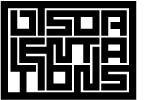The Object
by Travis Jeppesen on March 9, 2014
He wonders how he will ever begin to write about the object. A bit like writing in the dark…The object is there in front of him, and yet isn’t. Both at the same time. How can that be, that state of simultaneity. Oh very simple: it isn’t. He drinks all his thoughts up, visits his feelings. No, not there. Feeling a place to run away from. Objects have no feelings…but could they? A question of investiture. So shitty to be left to wonder. Leave the wonderment at the beginning (i.e. “He wonders how…”), let’s not get back there, not yet at least, too soon. Must move forward. The object contend with it. Let this moment be defined by it. Rather: let the object, its thingness, contaminate this temporal structure, he thinks, and thereby give rise to the formation of a moment. The beauty of a moment is that it passes a delightful turd. The turd is an object, but it is not the object he is now contending with. Contend with the non-turdness of the current object. In the moment. The moment of running away. Running away from feeling. The moment he finds himself facing the object, seated before it, forcing his thoughts to coalesce into something – words. Words the physical manifestation of something: the object. The object’s bluntness. Not a copy, not a simulacrum, for that is not something his words could ever be. His words, he thinks, he knows, are always something else, even when they purport to represent, to critically engage with, the object and its thingness, what it purportedly is outside of all possible and potential representation. And yet he – not subject (for he recognizes the imperative to momentarily suspend his own agency in order to engage with the task to be elucidated henceforth), but another object, another possible thing that things outside its particulate thingness – is not, in a sense, there. Not in the sense in which the object (the originary object, made originary by our writing of his writing of it, naturally) is there. The thing is, the goal he has set himself (his manic delirium, his sense of physicality, his manifestation of doom – his own private version thereof – through his manifestation of time, his awareness of spatio-temporal limitation) is to get beyond both facile representation but also and even mostly that “critical engagement” that the majority dismiss as the only possibility of interacting (he hates this word) with the object, and to enter into a state that would actually enable him to inhabit the object. And this, through writing. And for him, this writing, this striving-for-inhabiting, resonates with his current concern, to get beyond all the materiality – the thingness, the objectness – of writing – to contend with writing’s failed project of transmitting meaning.
How do I write myself into the object? he asks himself.
(Always a failure, then, every instance of writing, and yet how to overcome.)
Describe the object in its thingness.
He goes over, in his mind, all the pathways through which one might approach the object, positioned as it currently is, in the room, on the floor, at the center of the black cloth, not far from where he rests his feet. It is a kind of hunger, this desired transformation, transmutation, transubstantiation, but then no, that’s not it, for then what would the writing be, shit? Is it: to find a way to put the writing inside the object? No, but to make it (the writing) come out of it (the object) – and vice versa.
No eating, no shitting, he says aloud.
To inhabit means some encoding. Break that code to reseal it. That’s what the process will look like. The thing things itself thingingly, he quotes Heidegger. A certain bluntness of proprieties yes that will do. Nietzsche lost his mind, Heidegger found it, gave it back in hideous form: an object of a subject called loss. He steps outside – to get some air, he thinks. Fat man in a wig comes pattering down the cobblestones, waving a book over his head. It is Leibniz. Eat my monads, scum! he screams.
He slams the door in the philosopher’s face, runs back in to the object. Into the object, he would like, but he can’t have. The object wills, for certain, but not beyond itself, that is certain also. My thingness not for you to take, it seems to call out…or was that Leibniz out there, tormenting him. That book he was waving over his head, what was it. Go have a look. A glance through the window…but Leibniz is gone, you’ll never know what book it was now. Perhaps
it is better that way. Can substance be defeated? He knows: Desire to attain a state of total selflessness through the act, and yet this risks reducing writing to a sort of gratuitous masturbation. Cancel the second part of last thought. For this stab at conceptualization here is, admittedly, a means of propping up – propagating – excess.
The majority.
He initially wanted to call it “object-oriented criticism,” until he realized – not just that he had the terminology wrong – but that his misuse of the word criticism would only serve to confuse this invisible majority for whom he was writing against. For this – this obviating the decision-making process via the thereness of the object – is to be an act of writing: a writing to come. No, criticism, critique, too specific the terminology; he favors the openness, the activeness – the actness – of writing.
He is against control. He remembers reading a blurb on the jacket of the first edition of Barthelme’s novel, The Dead Father. Something like, “Well gee, folks, it might look wild and crazy, but its redemption as a work of art is that it is all actually tightly controlled by the author, that makes him a genius, by my validating authority as a critic…” Why, he remembers thinking, would control ever be regarded as a positive value in writing?
And of course, the answer to that is quite simple: We live in a society of total control, so it is only natural, from a psychological standpoint, that they seek out forms of (what they perceive to be) control in art, and that authorial exercise (as opposed to insane or otherworldly channeling) be the defining characteristic of genius for that invisible majority.
Thus, in writing the object (never writing of the object): Deny all perimeters.
The object and its mysterious anti-nature, he thinks. Object considered as manifestation of mind no that’s wrong.
Object and world, okay: he thinks that’s something he can do. Hesitating to proclaim it in these terms, but since so many mispronouncements have already polluted the stratosphere, perhaps his will serve as a cleansing agent. (Or else risk collapsing the unity of the entire multiverse by further polluting. A risk taken every time one opens one’s mouth and squeaks.) It is
a question of domains.
Treat myself to a fresh shirt, he decides.
When we write the object (and here, the definitionality of what’s being said matters, for we are not channeling classical exchanges of phenomenological wankery) we transiterate the resonant hallway of psychology to verify the made (constructed) status of objectitude (in its pure sense) and effectively emerge from this processual act as producers of a reality. He sees this as a completely viable anarcho-individualism that resists the fetishization of edges that gives the object its definitional status in our limited perceptuo-tactile exchange field therewith, and thus unleashes the animality that resides within the object’s previously controlled essence. And within that animality resides a will…
Once the object is written – and liberated thus – we may begin to speak of objectity, he reasons. Now, objectity goes beyond mere thingness in its necessitude to claim a spectral identity. Identity, in their way of thinking of it, always comes with an I. Expend your shit logic across the evening sky. Objectity neologistically combines the object with identity, but also reality, to lay claim to a scape that evades the perceptual diminutive that typically derogatorizes the object in the field of the major Them. The object, then, is vision, it is a surface filled with ego eyes. Its constructedness matters less than the way it goes about reconceiving our own willed surfaces.
But of course, he reasons, his object thus edified will most certainly clash and cocirculate concurrently with others’ edification of the object. And so the route becomes shortwinded, a show flourish – it is meant to be, in its measureless metonymity. No metaphoricity. Chains of difference overflowing, gather them up if you want into assorted cycles. Play god by defeating yesteryear. The answer, he suddenly conjectures, to Husserl dodging the intersubjectivity bullet: Everyone produces their own reality through their reciprocal arrangement of object-perceiving. Thus, in concept production, each concept is only designated for use by its original creator/inhabitor. Use exhaustibility. There are limits to this applicability: Why I Am So Unpopular. All these different realities clashing into one another. And the sparks caused by the interaction. No more human/nonhuman divisions, a rebirth of agency. All this, through the writing. He closes his eyes and sees thick blobs of text on paper. Pen rolls out of hand. From across the galaxy, the room, the object stares at him and sighs.


One comment
[…] “Thus, in writing the object (never writing of the object): Deny all perimeters.” In addition to his work as a novelist, art critic, and poet, TRAVIS JEPPESEN has developed what he terms “object-oriented writing”—writing that enacts a subjective, embodied encounter with and response to art objects. Jeppesen’s texts treat objects as inhabitable. By positioning his own voice within the object, he counters nearly all forms of critical analysis that assume a distance from objects in order to speak about them; as he observes, “Something that is located within an object can never be ‘about’ that object—aboutness is always external.” [From the online exhibition catalogue.] […]
by Deny all perimeters. | What Queer Reading on March 20, 2014 at 4:05 pm. #